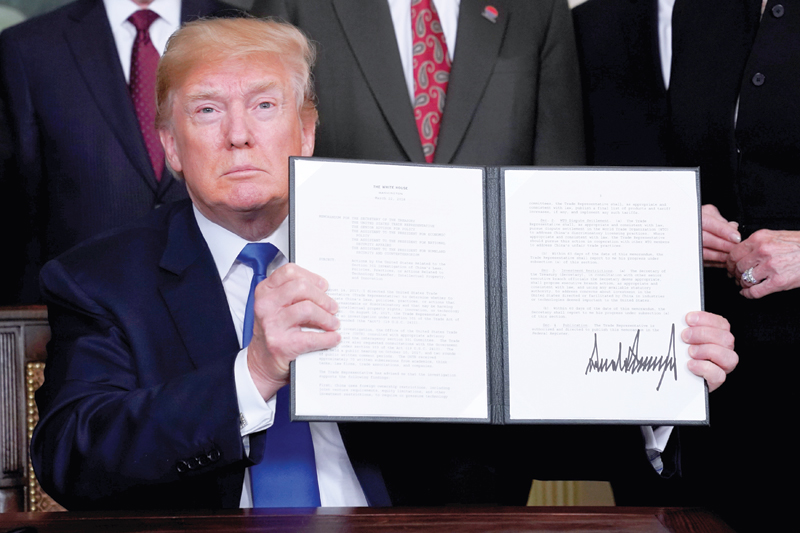

The Trump administration has said that it wants to reduce foreign tariffs and trade barriers. This is a worthy goal because even if average tariffs are generally low, they are quite high for certain products, like apparel and clothing.
Unfortunately, the administration’s approach of threatening US tariffs against foreign countries unless they change their trade practices — such as the recent announcement that the United States will level tariffs on $50 billion worth of Chinese imports — is unlikely to work as a pressuring tool.
A better approach — one that might appeal to Trump’s ego — would be a new round of global trade negotiations. If successful, they would go down in history as the “Trump Round” of trade talks.
Besides the tariffs on China, Trump’s decision to impose new tariffs on steel and aluminium shocked US allies, who were uncertain about whether they would be exempted.
While the administration has argued that these tariffs are for national security reasons, it is likely that they are partly being used as leverage to pressure other countries to lower their own barriers.
This approach to attacking foreign trade barriers will not work. Other countries are unlikely to give in to bullying, as they are focused on their own domestic politics.
As a result, any demand coming from the United States for countries to lower their barriers unilaterally, in the face of US threats, will likely be ignored or retaliated against.
Instead, via a new “Trump Round,” the administration can achieve its goals through a reciprocal reduction in tariffs and other trade barriers.
Early in his term, Trump made clear that negotiating “a lot of trade deals” would be an important part of his administration’s trade policy, and emphasised his preference for bilateral negotiations.
One year in, however, and the White House has not initiated any negotiations on new bilateral deals.
It is renegotiating two existing deals: Nafta, which Trump has threatened to terminate, and Korus, the US-South Korea trade pact that both parties agreed to revise and that, Trump threatened to delay until after the United States reaches a denuclearisation deal with North Korea.
While the Trump administration may prefer to negotiate trade deals bilaterally, this is an inefficient approach to securing concessions.
Going country by country is time-consuming. Negotiations with individual countries also may not be significant enough for someone like Trump, who is eager to make his mark on the world.
That’s where multilateral discussions come in. From Trump’s perspective, the benefits of these talks should be clear.
The Dillon Round, named after former US Treasury Secretary Douglas Dillon, and the Kennedy Round, named after John F Kennedy, established the General Agreement on Tariffs and Trade (GATT) as a successful forum for trade negotiations, and helped lay the foundation for the World Trade Organization.
The Trump Round could join them in the history books.
Concluding a multilateral trade negotiation would not only solidify Trump’s legacy, but also bring the United States back as a leader in international trade liberalisation.
Trump would be credited with lowering the tariffs of all members, and making trade more free (or “fair,” if he prefers that word).The question then becomes, if the United States is going to negotiate, what should it negotiate about? Trump seems particularly focused on high tariffs — a good place to start.
One of the reasons foreign tariffs are sometimes higher than US ones is that in past trade negotiations, US negotiators pushed for regulations on intellectual property and other issues rather than for lower tariffs.
The Trump administration can put tariffs back on the table. Since 1947 world leaders have concluded eight multilateral trade negotiation rounds.
The last successful effort, the 123-country Uruguay Round, ended in 1994, and led to the creation of the World Trade Organization (WTO). — Reuters
Simon Lester and Inu Manak
Oman Observer is now on the WhatsApp channel. Click here



